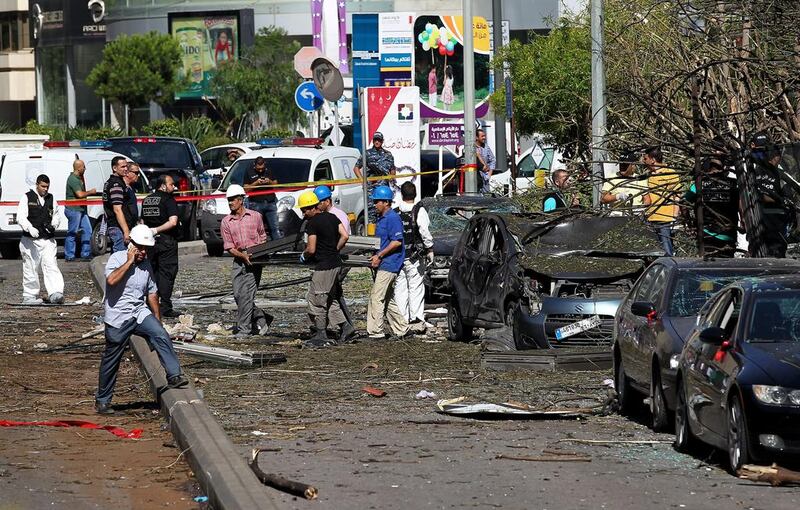Though Hizbollah suggested it had nothing to do with a bomb attack against a prominent Lebanese bank on Sunday evening, almost no one in Beirut takes this seriously.
The bomb came after weeks of disagreement between the party and the Lebanese banking sector, which has been implementing US legislation known as the Hizbollah International Financing Prevention Act of 2015 (HIFPA).
Sanctions
HIFPA imposes sanctions on all institutions that engage in transactions with Hizbollah or its entities, by prohibiting them from operating in the US financial system. In reaction to this, Lebanese banks have been closing accounts it suspects of belonging to individuals or institutions with ties to Hizbollah.
The party, in turn, has argued that the banks are over-interpreting their mandate, and that they must close only the accounts of those designated by the US Treasury’s Office of Foreign Assets Control, which administers and enforces sanctions related to US foreign policy goals. But to the banks that is not good enough.
Being shut off from the American financial system is the kiss of death for international banks. It means they cannot engage in dollar transactions via New York, which would effectively oblige them to close down. And as most Lebanese bankers know, even being identified by the United States as a HIFPA offender could have a toxic effect on the banking system as a whole, as doubts rise about its credibility.
Banking officials, particularly the governor of the central bank, Riad Salameh, have argued that they have no option but to implement HIFPA.
Danger to the economy
This carries some weight, as Lebanon’s economy is entirely dependent on the banks and their purchase of government treasury bills to finance the country’s debt. If the banking sector were targeted for showing flexibility towards Hizbollah, the economy would be in real danger of eventual collapse.
Past American financial legislation, by threatening to cut off access to US markets, has succeeded in dismantling bank practices worldwide that the United States opposes. It is fears of a cut-off, for instance, coupled with more direct sanctions, that obliged Switzerland to abandon its policy of banking secrecy with regard to Americans.
Indeed, the United States has been able to impose a global oversight programme on banks known as the Foreign Account Tax Compliance Act, or FATCA. Under FATCA, banks are obliged to send annual reports to the Internal Revenue Service on their American account holders, as a way for the IRS to determine whether they are reporting their income accurately.
The main instrument of pressure in FATCA is relevant to the HIFPA debate. If banks fail to report on their American account holders, even accidentally, the US authorities are entitled to withhold 30 per cent of dollar transactions relating to that account. As a consequence, Lebanese banks, like those everywhere, have scrambled to comply with FATCA, even though they have incurred high costs to do so.
In addition, banks have been compelled to introduce much more intricate know-your-customer procedures, to ensure their clients are not hiding their American nationality, or using non-American family members to conceal money. Opening an account in Beirut can now take a very long time because banks are invariably erring on the side of caution.
Banks' behaviour
The banks’ behaviour on FATCA, born of fear, is a good indicator of what Hizbollah is facing. Banks, almost by definition, are risk averse, and to avoid the possibility of being seen as non-compliant, they have usually adopted an attitude that goes above and beyond what is necessary.
The problem is that such an approach is seen as warranted with Hizbollah.
The banks worry that showing any flexibility with the party could lead to more dire consequences if Treasury designations are widened. If a bank were merely denounced by the Americans for a particular reason, this could create the impression that the whole system is implicated in concealment.
If that were to occur, the lack of confidence in the banking system would spread and many account holders could prefer to send their money elsewhere, rendering the system more vulnerable. More important, other major banks worldwide would refuse to continue working with Lebanese banks.
A misstep
Hizbollah appears to believe that intimidation can strengthen its bargaining hand with the banks. However, it doesn’t seem to grasp that, pound for pound, American intimidation is far greater, posing an existential threat to the banking sector.
Indeed, if Hizbollah were to place bombs at every bank in the country, ultimately it would only hurt itself. Under heightened duress, the bankers could become even less amenable to compromise. Between bombs and money, the latter usually wins.
Michael Young is a writer and editor in Beirut
On Twitter @BeirutCalling
More from this author:
■ Saad Hariri spies a political lifeline in Lebanon
■ America's anti-ISIL plan brings many risks with it





